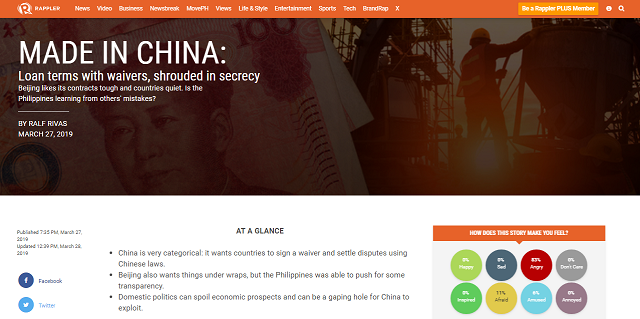Rappler Checks Fine Print on China Loans

WITH THE promise of accelerated economic growth, the Duterte administration’s Build, Build, Build program has allocated PHP8 trillion for infrastructure. But halfway through the Duterte presidency, much remains to be seen regarding the program’s implementation. As with any government project, funding must be of primary concern for anyone who wants to track the program’s progress — or the lack of it.
Former representative and now senatorial candidate Neri Colmenares was the first to call attention to the “onerous” loan agreement for the PHP 3.69-billion Chico River Pump Irrigation Project, one of the flagship infrastructure projects funded in part through China’s Official Development Assistance (ODA). Speaking in a forum last February 27, he said the deal “highly favors China” in terms of interest rates and possible concessions of patrimonial properties. Justice Antonio Carpio raised the same concern on March 22, referring specifically to the gas-rich Recto Bank as collateral that China may demand should the Philippines fail to pay its loans back.
The government’s economic managers contradicted Colmenares and Carpio. They claimed that the contracts did not require collateral, and that the Philippines’ defaulting on the loans is highly unlikely because of the country’s good credit history.
Much of the reports simply followed the exchange between the two sides. But CMFR cheers Rappler for following up the leads provided by Colmenares and Carpio. They examined the key provisions of the nine loan agreements for big-ticket infrastructure projects that the Department of Finance (DOF) is publicizing on its website.
Rappler’s article “Made in China: Loan terms with waivers, shrouded in secrecy” looked at clauses on waivers, confidentiality and the mechanisms for the settlement of disputes between lender and borrower. Rappler reported that of the nine contracts released by the DOF, the two agreements with China—for the Chico River irrigation project and for the Kaliwa Dam Project—were indeed worded in China’s favor.
Among the contentious stipulations of the agreement noted by Rappler: the waiver of sovereign immunity, meaning the borrowing country can be sued by the lender; waiver of immunity over the Philippines’ patrimonial assets and assets dedicated to commercial use; the written consent of the lender before the agreements can be published; and two arbitration venues chosen by China itself, one of which also requires the disputing parties to nominate arbitrators from a list that it will provide.
The report also analyzed provisions in two loans with South Korea, four with Japan and one with the World Bank. Rappler found that loans from South Korea and Japan did not include explicit waivers of sovereign immunity and confidentiality clauses, and did not mention anything about patrimonial assets. The arbitration process for South Korea and Japan requires equal representation from the lender and the borrowing country, and do not specify the venue of the arbitration.
Rappler said “the case of Chinese loans should be appreciated in the context of how Beijing continued to lend to countries which had bad loan management records.” Rappler cited Sri Lanka as an example. After a long civil war, Sri Lanka needed money to rebuild its economy. The country accepted Chinese financing for infrastructure projects, but these failed to generate sufficient revenue, resulting in significant concessions of Sri Lanka’s properties to China.
Rappler listed the political and economic factors that may affect the repayment of the loans: the drop in economic growth in 2018, the 2019 national budget impasse, and the possible shift to federalism. Rappler also mentioned that the economic crisis caused by the Marcos regime’s infrastructure thrust, which was similarly loan-driven, should be “enough (of a) cautionary tale for Filipinos.” Since 19 of 75 major infrastructure projects under the Duterte administration will be funded by China, the mismanagement of these deals “can put the country at a huge disadvantage,’ the report said.
Other news outfits would do well to pick up or go beyond the issues raised in the Rappler story. The president subsequently ordered the Justice
Leave a Reply